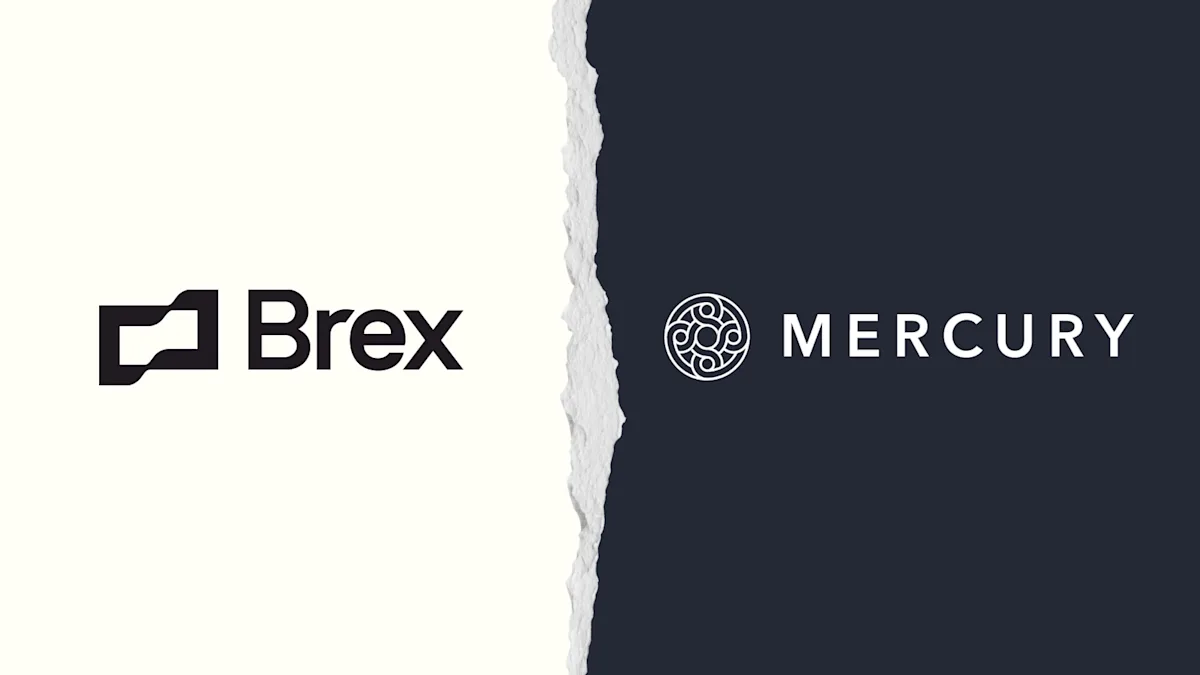Choosing a business banking platform isn’t about picking the “best” option on paper—it’s about finding what fits the way your business actually runs. A small team with simple expenses has very different needs than a growing company managing spend across multiple people, cards, and approvals.
Brex and Mercury both offer modern business banking tools, but they’re built with different operating models in mind. This guide looks at how each platform approaches things like eligibility, team access, accounting integrations, credit options, and day-to-day money management, so you can decide which one aligns with how your business works today—and where it’s headed next.
Quick Comparison: Brex vs Mercury
Feature | Brex | Mercury |
Best For | Established, incorporated businesses | Startups and small businesses |
Eligibility | U.S. incorporated businesses only | U.S.-incorporated startups and small businesses (with some restricted categories) |
Pricing | Essentials (free), Premium ($12/user/mo), Enterprise | No monthly fees |
FDIC Coverage | Up to $6 million | Up to $5 million |
Card Type | Corporate credit cards | Business debit cards + IO credit card |
Credit Limits | Dynamic, 10-20x higher than traditional | Based on account balance |
Rewards | Up to 7x points (category-based) | 1.5% cashback (IO credit card) |
Accounting Integrations | QuickBooks Online, Xero, Sage Intacct, NetSuite, Oracle Fusion | QuickBooks Online, Xero, NetSuite |
Treasury Minimum | None | $250,000 |
What Brex and Mercury Actually Serve
Each platform has carved out a distinct market position based on company size, structure, and operational needs.
Brex's Approach
Brex positions itself as an "intelligent finance platform" for established, incorporated businesses needing sophisticated expense management and credit access. Only U.S. incorporated businesses (C-corps, S-corps, LLCs, LLPs) qualify, with eligibility focusing on business health rather than universal thresholds.
The platform operates on a subscription model with three tiers: Essentials (no per-user charges), Premium ($12/user/month), and Enterprise (custom pricing). Brex's core differentiator lies in combining corporate credit cards with banking services and AI-powered expense management. Their corporate credit cards provide spending float capability, meaning authorized cardholders can make purchases before cash leaves your account.
Mercury's Approach
Mercury explicitly targets startups and small businesses with the mission to "make banking better for startups." The platform requires no minimum revenue, no personal guarantees, and no minimum employee count, making it accessible to solo entrepreneurs and early-stage companies. Mercury's lower barrier to entry makes it a natural starting point for founders who need banking set up quickly without extensive documentation.
Interest Rates and FDIC Protection
Treasury yields and deposit protection vary significantly between platforms, affecting how much your idle cash earns and how much protection your deposits receive.
Current Rates
Brex offers up to 3.74% Annual Percentage Yield (APY) (as of January 25, 2026) on invested cash through their Dreyfus Government Cash Management money market fund, with 0% yield on uninvested cash.
Mercury provides a variable APY on Mercury Treasury, requiring a $250,000 minimum across all Mercury accounts.
FDIC Coverage
Brex offers up to $6 million in FDIC coverage through their Insured Cash Sweep network distributing cash across 27 partner banks.
Mercury offers up to $5 million in FDIC coverage through a network of partner banks, with deposits automatically distributed across their sweep networks.
Software Connections and Accounting
Both platforms connect with accounting software, but the depth of integration and supported platforms differ based on their target markets.
Brex connects with leading accounting platforms including Sage Intacct, NetSuite, and Oracle Fusion, providing automatic categorization, receipt syncing, vendor mapping, and billable expense tracking.
Mercury connects with QuickBooks Online, Xero, and NetSuite, supporting automatic categorization and receipt syncing with both manual and automated GL code assignment options.
QuickBooks Online Connection
Brex provides two distinct methods: a direct connection with automatic transaction categorization, memo and receipt syncing, automatic vendor mapping, and billable expense tagging, plus a traditional bank feed method for manual categorization.
Mercury offers a simpler sync from Mercury to QuickBooks, with users able to assign GL codes manually or set up categorization rules before syncing.
Team Access and Permissions
How you control who accesses your accounts and what they can do varies substantially between platforms, reflecting their different target company sizes.
Permission Systems
Brex offers six standard roles: Account Admin, Card Admin, Travel Admin, Bookkeeper, Employee, and AP Clerk. Administrators can construct granular custom roles by mixing specific permissions across cards, reimbursements, accounting, bills, and travel.
Mercury offers four roles: Admin, Bookkeeper, Employee, and Custom User with limited role customization.
Card Programs and Spending Controls
Brex issues unlimited physical and virtual corporate credit cards with dynamic credit limits typically 10-20x higher than traditional cards. Key spending controls include:
Per-card spending limits
Per-user and department budgets
Category-based restrictions
Merchant Category Code blocking
These controls allow finance teams to enforce spending policies automatically rather than reviewing transactions after the fact.
Mercury issues physical debit cards and unlimited instant virtual debit cards. The platform offers individual card spending limits, transaction tracking with alerts, and basic merchant blocking.
Business Tools and Additional Services
Beyond banking basics, each platform offers credit products and expense management tools that reflect their target customer profiles.
Corporate Credit Access
Brex uses flexible, tiered eligibility criteria for its corporate card, with requirements based on company type, financial health, and growth potential. The card provides category-based rewards up to 7x points on rideshare services, 4x on flights and hotels, and 3x on restaurants.
Mercury's IO credit card requires a Mercury business account and certain deposit balances, offering 1.5% unlimited cashback on all purchases with no personal credit check or personal guarantee.
Bill Pay and Expense Management
Brex Bill Pay features AI-powered invoice scanning, auto-approval workflows, automated bill payment scheduling, and multi-entity support.
Mercury Bill Pay offers automated accounts payable with bill details extraction, duplicate bill detection, and payment scheduling at no additional cost.
Choosing Between Brex and Mercury for Your Business
Both platforms have mixed user reviews on Trustpilot, with ratings in the 3-4/5 range and varied feedback on customer service.
Choose Brex if:
Your established business has complex spending policies requiring automated enforcement
You need AI-powered automation and enterprise connections
Your organization requires granular controls that justify the Premium tier
Choose Mercury if:
You're a startup or established company that values operational simplicity over feature complexity
You prioritize reliable day-to-day operations
You prefer straightforward banking operations without advanced features
Bridging the Gap Between Simplicity and Complexity
Many growing businesses find themselves caught between Mercury's simplicity and Brex's enterprise complexity. They've outgrown basic banking but don't need the advanced automation and enterprise-tier features that come with higher price tags. What they need are collaborative features and cash organization tools that match their current stage of growth.
Relay addresses this middle ground as a collaborative banking platform designed specifically for growing teams. The platform offers multiple accounts1 for organizing cash by purpose, team features that scale naturally with your business, and direct QuickBooks Online integration—all with no revenue requirements or minimum account balances on the Starter plan.
If you need more visibility and control than Mercury provides but less complexity than Brex demands, sign up for Relay to see how purpose-built accounts can simplify your financial operations.
1Relay is a financial technology company and is not an FDIC-insured bank. Banking services provided by Thread Bank, Member FDIC. FDIC deposit insurance covers the failure of an insured bank. Certain conditions must be satisfied for pass-through deposit insurance coverage to apply.





